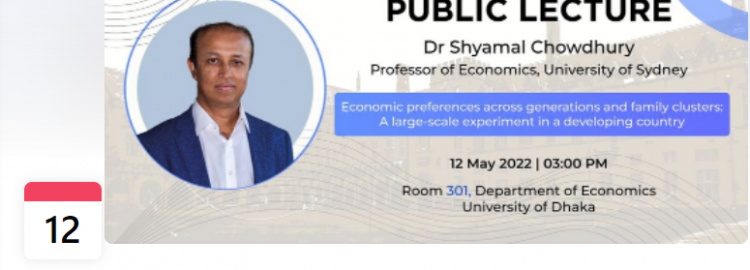Using data from large-scale experiments with entire families for Bangladesh, the research finds that both mothers’ and fathers’ risk, time and social preferences are significantly positively correlated with their children’s economic preferences. Results differ from evidence for rich countries.
Shyamal Chowdhury (University of Sydney) presents the paper in a public speech in the University of Dhaka on May 12, 2022.

GLO Discussion Paper No. 592, 2020 now forthcoming as
Economic preferences across generations and family clusters: A large-scale experiment in a developing country
by Chowdhury, Shyamal & Sutter, Matthias & Zimmermann, Klaus F.
in: Journal of Political Economy
GLO Fellows Shyamal Chowdhury and Matthias Sutter & GLO President Klaus F. Zimmermann

Shyamal Chowdhury 
Matthias Sutter 
Klaus F. Zimmermann
Author Abstract: Our large-scale experiment with 542 families from rural Bangladesh finds substantial intergenerational persistence of economic preferences. Both mothers’ and fathers’ risk, time and social preferences are significantly (and largely to the same degree) positively correlated with their children’s economic preferences, even when controlling for personality traits and socio-economic background. We discuss possible transmission channels and are the first to classify all families into one of two clusters, with either relatively patient, risk-tolerant and pro-social members or relatively impatient, risk averse and spiteful members. Classifications correlate with socio-economic background variables. We find that our results differ from evidence for rich countries.

GLO Discussion Papers are research and policy papers of the GLO Network which are widely circulated to encourage discussion. Provided in cooperation with EconStor, a service of the ZBW – Leibniz Information Centre for Economics, GLO Discussion Papers are among others listed in RePEc (see IDEAS, EconPapers). Complete list of all GLO DPs – downloadable for free.
The Global Labor Organization (GLO) is an independent, non-partisan and non-governmental organization that functions as an international network and virtual platform to stimulate global research, debate and collaboration.
Ends;

